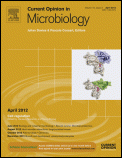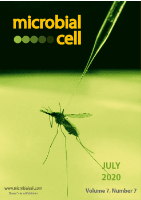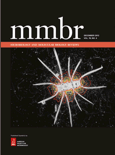
CURRENT OPINION IN MICROBIOLOGY
Scope & Guideline
Fostering critical discussions in infectious diseases.
Introduction
Aims and Scopes
- Antimicrobial Resistance:
Research exploring the mechanisms, implications, and strategies to combat antimicrobial resistance, including novel drug discovery and resistance pathways. - Microbial Host Interactions:
Studies focusing on the complex interactions between microbes and their hosts, emphasizing immune responses, pathogenicity, and symbiotic relationships. - Microbial Ecology and Diversity:
Investigations into the ecological roles of microbes, their interactions within communities, and their impacts on health, agriculture, and the environment. - Synthetic and Systems Biology:
Research employing synthetic biology and systems biology approaches to engineer microbial systems for various applications, including biotechnology and environmental sustainability. - Fungal Pathogenesis and Biology:
Insights into the biology of fungal pathogens, their interactions with hosts, and the mechanisms underlying fungal diseases. - Phage Biology and Applications:
Exploration of bacteriophages, their interactions with bacterial hosts, and their potential as therapeutic agents against bacterial infections. - Metabolism and Cellular Regulation:
Studies on microbial metabolism, signaling pathways, and regulatory mechanisms that govern microbial growth and adaptation.
Trending and Emerging
- Microbiome Research:
There is an increasing focus on the human microbiome and its role in health and disease, including its implications for personalized medicine and therapeutic interventions. - Antimicrobial Resistance Mechanisms:
Research into the mechanisms of antimicrobial resistance, including genetic and environmental factors, is gaining prominence as resistance threats continue to rise globally. - Host-Microbe Interactions in Disease:
An emerging emphasis on the intricate interactions between pathogens and host defenses, particularly in the context of infectious diseases and immune responses. - Innovative Therapeutic Approaches:
The rise of alternative therapeutic strategies such as phage therapy, microbial consortia, and engineered probiotics reflects a significant shift towards novel treatment modalities. - Environmental Microbiology and Climate Change:
Research addressing the effects of climate change on microbial communities and their ecological roles is becoming increasingly relevant as environmental concerns grow. - Synthetic Biology Applications:
The use of synthetic biology for engineering microbial systems for biotechnological applications is on the rise, showcasing the potential for innovation in microbial applications.
Declining or Waning
- Traditional Antibiotic Discovery:
While the search for new antibiotics remains critical, the focus has shifted from traditional approaches to innovative strategies such as synthetic biology and novel compounds, leading to a decrease in publications centered solely on conventional antibiotic discovery. - Basic Microbial Physiology Studies:
Research purely focused on fundamental aspects of microbial physiology without direct application or relevance to health, disease, or environmental challenges appears to be less represented in recent publications. - Single-Organism Studies:
There is a noticeable trend towards more integrative studies that consider microbial communities rather than isolated organisms, leading to fewer papers emphasizing single-species research. - Historical Microbiology:
Papers focusing on historical microbial studies, such as those examining the evolution of microbes without contemporary implications, have become less frequent as the field emphasizes current and applied research.
Similar Journals

MICROBIOLOGY AND IMMUNOLOGY
Unveiling the Secrets of Pathogens and Immune ResponsesMICROBIOLOGY AND IMMUNOLOGY, an esteemed journal published by WILEY, serves as a vital resource for researchers and professionals in the fields of microbiology, immunology, and virology. With its ISSN 0385-5600 and E-ISSN 1348-0421, this journal has been a cornerstone in scientific literature since its inception in 1977, bridging decades of research and innovation through its comprehensive coverage of emerging trends and discoveries. Although this journal operates without open access, it maintains a commendable presence in academic circles, reflected in its 2023 Quartile rankings of Q3 across the categories of Immunology, Microbiology, and Virology. As part of an important discourse in these disciplines, MICROBIOLOGY AND IMMUNOLOGY ensures its scholarly contributions are relevant to both seasoned researchers and emerging scholars. Positioned in a competitive journal landscape, with Scopus ranks indicating a median percentile across its fields, it remains committed to advancing knowledge through peer-reviewed articles, thereby supporting the continuous evolution of its focus areas. The journal's current scope encompasses topics critical for understanding pathogen-host interactions and the immune response, making it a crucial publication for any academic library or individual scholar dedicated to the biological sciences.

mSphere
Pioneering research at the intersection of microbiology and molecular biology.mSphere is a leading open-access journal published by the American Society for Microbiology, dedicated to the dynamic fields of Microbiology and Molecular Biology. Since its inception in 2016, mSphere has rapidly established itself as a reputable source of scholarly research, achieving notable impact factors and excellence within the academic community. The journal ranks in the top quartile (Q1) amongst its peers in Microbiology, and Q2 in the field of Molecular Biology, demonstrating its significance and relevance through Scopus rankings—specifically, it holds the #42 spot out of 182 in the Microbiology category and #108 out of 410 in Molecular Biology. With an editorial commitment to advancing the understanding of microbial and molecular sciences, mSphere provides an accessible platform for researchers, professionals, and students alike to disseminate groundbreaking findings. The journal promotes rigorous peer-review and invites innovative contributions aimed at enhancing microbial research mobility and molecular exploration. Accessible openly since 2016, mSphere continues to thrive as an influential publication driving scientific dialogue and discovery in the microbiological sciences.

Microbial Cell
Advancing the frontiers of microbial science.Microbial Cell is a distinguished open-access journal published by SHARED SCIENCE PUBLISHERS OG, focusing on the dynamic fields of microbiology, biochemistry, and molecular biology. Since its establishment in 2014, Microbial Cell has been at the forefront of disseminating cutting-edge research essential for advancing our understanding of microbial functions and interactions. With a commendable impact factor and ranking in the top quartiles (Q1 and Q2) across several categories, including Applied Microbiology and Biotechnology and Parasitology, this journal serves as an invaluable resource for researchers, professionals, and students alike. It features a comprehensive scope that encompasses the latest findings in genetics, cell biology, and virology, facilitating the academic community's access to high-quality peer-reviewed work. Microbial Cell not only contributes to advancing microbial sciences but also fosters an inclusive platform for knowledge sharing and collaboration in the scientific community.

MOLECULAR MICROBIOLOGY
Advancing the Frontiers of Microbial ScienceMOLECULAR MICROBIOLOGY is a prestigious academic journal published by Wiley that has been at the forefront of research in the fields of microbiology and molecular biology since its inception in 1987. With an impressive Q1 rating in Microbiology and a Q2 rating in Molecular Biology for 2023, this journal serves as a vital platform for disseminating high-impact research that advances our understanding of microbial processes and interactions at the molecular level. The journal's ISSN is 0950-382X, and the E-ISSN is 1365-2958, making it easily accessible to a global audience of researchers, professionals, and students. Though not an Open Access journal, MOLECULAR MICROBIOLOGY remains committed to providing valuable insights and fostering knowledge exchange in the academic community. Situated in the United Kingdom and indexed in prominent databases like Scopus, the journal holds a strong standing, with current rankings reflecting its influential role in the academic landscape. Researchers in the field are invited to contribute and engage with cutting-edge discoveries that will shape the future of microbiological sciences.

Current Research in Microbial Sciences
Empowering Scientific Collaboration in Microbial ResearchCurrent Research in Microbial Sciences is a distinguished peer-reviewed journal published by Elsevier, focusing on the dynamic and rapidly advancing fields of microbiology and infectious diseases. With an ISSN of 2666-5174, this journal has established itself as an essential resource for researchers, professionals, and students alike, offering the latest findings and insights from 2020 to 2024. The journal holds a significant position in the academic landscape, achieving a Q2 ranking across multiple categories, including Immunology and Microbiology, Infectious Diseases, and Medical Microbiology, demonstrating its impact in these critical areas of study. With impressive Scopus rankings—such as being placed in the 94th percentile for Immunology and Microbiology—current research is well-supported by a thriving scientific community. Although the journal is not open access, it serves as a vital platform for disseminating high-quality research and fostering collaboration within the microbial sciences. Engaging with this journal enables professionals and researchers to stay abreast of innovations and contribute to the collective body of knowledge that shapes our understanding of microbial interactions and infectious diseases.

MICROBIOLOGY AND MOLECULAR BIOLOGY REVIEWS
Illuminating the Pathways of Microbial Life and Molecular MechanismsMICROBIOLOGY AND MOLECULAR BIOLOGY REVIEWS, published by the American Society for Microbiology, is a premier journal dedicated to advancing the fields of microbiology and molecular biology. With an impressive impact factor reflective of its Q1 ranking in categories such as Immunology, Infectious Diseases, and Molecular Biology, this journal consistently showcases high-quality, peer-reviewed articles that contribute to the current understanding of microbial life and molecular mechanisms. Operating since 1997, the journal aims to bridge the gap between microbiological methods and molecular biology applications, making it an essential resource for researchers, professionals, and students alike. Readers can access content through various platforms, ensuring that the latest findings are readily available to the scientific community. With its esteemed reputation, MICROBIOLOGY AND MOLECULAR BIOLOGY REVIEWS remains a leading voice in the exploration of the life sciences, catering to a broad audience deeply invested in unraveling the complexities of microbial and molecular systems.

AIMS Microbiology
Unlocking the mysteries of microbes, one study at a time.AIMS Microbiology, published by the American Institute of Mathematical Sciences (AIMS), is an esteemed Open Access journal dedicated to advancing the field of microbiology since its inception in 2015. With an ISSN of 2471-1888, the journal aims to disseminate high-quality research and innovative findings pertaining to both fundamental and applied microbiology, encompassing areas such as medical microbiology, immunology, and related life sciences. Recognized for its academic rigor, AIMS Microbiology has achieved a significant standing, evidenced by its current Q2 ranking in both Microbiology and Medical Microbiology categories, along with impressive percentile rankings within prestigious Scopus metrics. Based in the United States, the journal not only emphasizes accessibility and widespread dissemination of knowledge but also plays a crucial role in fostering collaboration among researchers and professionals in the microbiological sciences. By providing a platform for collaborative research and innovative ideas, AIMS Microbiology is poised to influence the future development and application of microbiological research, making it a valuable resource for students, researchers, and practitioners alike.

Cell Host & Microbe
Transforming Understanding of Microbial InfluenceCell Host & Microbe is a premier journal published by CELL PRESS, dedicated to advancing the field of host-microbe interactions and infectious diseases. With an impact factor reflecting its esteemed position among scholarly publications, this journal not only focuses on the intricacies of microbiology but also delves into critical areas such as Cancer Research, Immunology, and Molecular Biology, maintaining a distinguished Q1 ranking across several categories. Since its inception in 2007, Cell Host & Microbe has been at the forefront of disseminating high-quality research, providing invaluable insights for researchers, professionals, and students alike. The journal is committed to promoting understanding of the complex relationships between microbial entities and their hosts, filtering groundbreaking research from the top echelons. Located in the heart of Cambridge, MA, USA, this journal serves as an essential resource for anyone looking to deepen their knowledge in microbiology and its applications in health and disease.

ARCHIVES OF MICROBIOLOGY
Connecting Disciplines Through MicrobiologyThe Archives of Microbiology, published by Springer, is a reputable journal in the field of microbiology, serving as a vital platform for the dissemination of groundbreaking research and critical reviews since its inception in 1974. With an ISSN of 0302-8933 and an E-ISSN of 1432-072X, this journal operates out of Germany and maintains a global reach, promoting high-quality scholarship across multiple disciplines, including biochemistry, genetics, and molecular biology, as evidenced by its Q2 ranking in Medicine (miscellaneous) and consistent Q3 placements in other categories in 2023. Although the journal does not offer open access options, its rigorous peer-review process ensures that published articles are of the highest standard, making it an essential resource for researchers, professionals, and students keen on advancing their understanding of microbial sciences. As the journal converges toward 2024, it remains committed to fostering innovative microbiological research and facilitating interdisciplinary dialogue within the scientific community.

Microbial Physiology
Advancing the Frontiers of Microbial KnowledgeMicrobial Physiology is a premier, peer-reviewed journal published by KARGER, dedicated to advancing the field of microbiology through innovative research and reviews. With an ISSN of 2673-1665 and an E-ISSN of 2673-1673, the journal stands out in the academic landscape having established a strong track record since its inception in 2020, converging its scope until 2024. It proudly holds a Q2 category ranking in several key areas including Applied Microbiology and Biotechnology, Biochemistry, and Microbiology, making it an essential resource for researchers and professionals in these disciplines. The journal provides open access options to ensure that cutting-edge findings are widely disseminated, fostering collaboration and knowledge sharing. As a vital contributor to the ongoing discourse in microbial physiology, the journal serves as a platform for novel discoveries and methodologies that can significantly impact health, industry, and environmental sustainability. Located in Basel, Switzerland, it brings together a global community of scholars eager to further explore the complexities of microbial life.